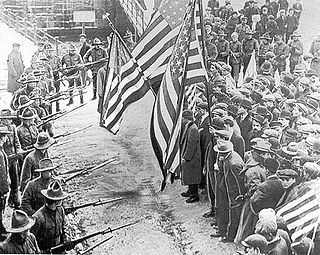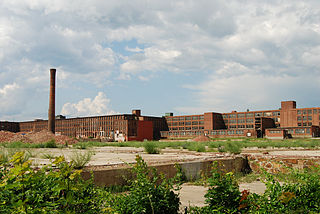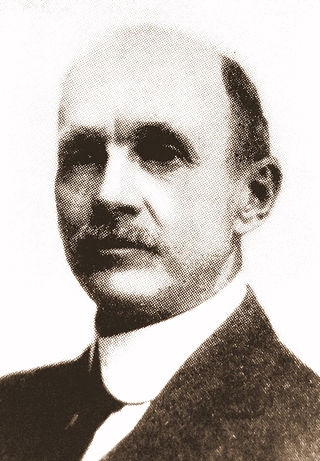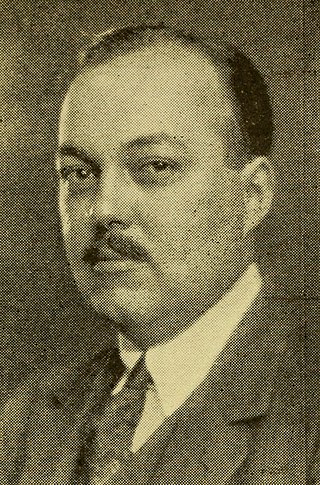Related Research Articles

The Industrial Workers of the World (IWW), whose members are nicknamed "Wobblies", is an international labor union founded in Chicago in 1905. The nickname's origin is uncertain. Its ideology combines general unionism with industrial unionism, as it is a general union, subdivided between the various industries which employ its members. The philosophy and tactics of the IWW are described as "revolutionary industrial unionism", with ties to socialist, syndicalist, and anarchist labor movements.

Hopedale is a town in Worcester County, Massachusetts, United States. It is located 25 miles southwest of Boston, in eastern Massachusetts. With origins as a Christian utopian community, the town was later home to Draper Corporation, a large loom manufacturer throughout the 20th century until its closure in 1980. Today, Hopedale has become a bedroom community for professionals working in Greater Boston and is home to highly ranked public schools. The population was 6,017 as of the 2020 census.

The nature and power of organized labor in the United States is the outcome of historical tensions among counter-acting forces involving workplace rights, wages, working hours, political expression, labor laws, and other working conditions. Organized unions and their umbrella labor federations such as the AFL–CIO and citywide federations have competed, evolved, merged, and split against a backdrop of changing values and priorities, and periodic federal government intervention.

The Lawrence Textile Strike, also known as the Bread and Roses Strike, was a strike of immigrant workers in Lawrence, Massachusetts, in 1912 led by the Industrial Workers of the World (IWW). Prompted by a two-hour pay cut corresponding to a new law shortening the workweek for women, the strike spread rapidly through the town, growing to more than twenty thousand workers and involving nearly every mill in Lawrence. On January 1, 1912, the Massachusetts government enforced a law that cut mill workers' hours in a single work week from 56 hours, to 54 hours. Ten days later, they found out that pay had been reduced along with the cut in hours.

EbenSumner Draper was an American businessman and politician from Massachusetts. He was for many years a leading figure in what later became the Draper Corporation, the dominant manufacturer of cotton textile process machinery in the world during the late 19th and early 20th centuries. He served as the 44th governor of Massachusetts from 1909 to 1911.

Wickliffe Preston Draper was an American political activist. He was an ardent eugenicist and lifelong advocate of strict racial segregation. In 1937, he founded the Pioneer Fund for eugenics and heredity research; he later became its principal benefactor.
The following is a timeline of labor history, organizing & conflicts, from the early 1600s to present.

Eugene Noble Foss was an American politician and manufacturer from Massachusetts. He was a member of the United States House of Representatives and served as a three-term governor of Massachusetts.
George A. Draper was an American textile industrialist.

William Franklin Draper was an American businessman, industrialist, and soldier who served as a U.S. Representative from Massachusetts.
A wildcat strike is a strike action undertaken by unionised workers without union leadership's authorization, support, or approval; this is sometimes termed an unofficial industrial action. The legality of wildcat strikes varies between countries and over time.
The Hopedale Community was founded in Milford, Massachusetts, in 1843 by Adin Ballou. He and his followers purchased 600 acres (2.4 km2) of land on which they built homes for the community members, chapels and the factories for which the company was initially formed. The area was later split from Milford and became the town of Hopedale, Massachusetts.

The Draper Corporation was once the largest maker of power looms for the textile industry in the United States. It operated in Hopedale, Massachusetts for more than 130 years.

The Hopedale Village Historic District encompasses much of the historic 19th century industrial village center of Hopedale, Massachusetts. Its main focus is the mill complex of the Draper Company at Hopedale and Freedom Streets; the district includes much of northern Hopedale, extending along Dutcher and Freedom Streets, and including the mill pond. It extends to the south just beyond Mendon Street, including properties on that street from the Milford line west to Hopedale Cemetery. The district was added to the National Register of Historic Places in 2002. The district has been included as part of the Blackstone River Valley National Historical Park.

James Henry Northrop, was born in Keighley, West Yorkshire in the United Kingdom, where he worked in the textile industry. He emigrated to Boston, Massachusetts, in 1881. By 1898, working in Hopedale, Massachusetts for George Draper and Sons he had filed several hundred patents some of which were used in the Northrop Loom. He retired at 42. He died in Santa Ana, California on 12 December 1940, at 84.

The 1928 United States Senate election in Massachusetts was held on November 6, 1928, with Democratic incumbent David I. Walsh defeating his challengers.
Alonzo Granville Draper was a volunteer officer in the Union Army during the American Civil War who eventually earned the grade of brevet brigadier general. During his early career, Draper was an outspoken advocate of various social causes, particularly worker's rights. As an officer during the Civil War, Draper was best known as the commander of the 36th United States Colored Troops.
John J. "Johnny" Ballam was an American Marxist political activist and trade union organizer. He is best remembered as a founding member and one of the pioneer leaders of the Communist Party of America and as a leader of the Trade Union Unity League in the textile industry during the 1930s.
The New England Shoemakers Strike of 1860 or Lynn Shoeworkers Strike began on February 22, 1860 with 3,000 shoemakers walking off their jobs in Lynn, Massachusetts. It ended in April with modest gains for shoemakers, including pay increases and owner recognition of some labor unions. Approximately 20,000 workers went on strike across New England which made it the largest mass walkout in American history prior to the Civil War.

Eben Sumner Draper was an American businessman and politician who served in the Massachusetts General Court, was president of the Milford National Bank & Trust, and was the last member of his family to serve on the board of directors of the Draper Corporation. He was the son of Massachusetts Governor Eben Sumner Draper.
References
- ↑ Tejada, Susan (2012). In Search of Sacco and Vanzetti: Double Lives, Troubled Times, and the Massachusetts Murder Case That Shook the World. Northeastern. pp. 51–53. ISBN 978-1-55553-730-2.
